
Darren Rodwell is leader of the council in the London Borough of Barking and Dagenham in east London. He is also standing as the Labour candidate to become MP for Barking in the 4 July general election ŌĆō and is this weekŌĆÖs guest on the Home Truths podcast.

Born in Barking and brought up in Dagenham, RodwellŌĆÖs declared aim has been to deliver 50,000 homes in his borough by 2037 through partnerships with developers. He is credited with achieving the largest number of social or affordable housing starts in any London borough and claims to have delivered 20% of all of the capitalŌĆÖs new starts for this tenure each year for the past five years.
In todayŌĆÖs interview, which is released just days after the election was announced, Rodwell explains how the council has increased housing supply via Be First, its urban regeneration arm, and Reside, which provides rental homes at 50% to 80% of market rates.
He also talks extensively about how growing up on the Becontree Estate shaped his politics, how his model for working with the private sector helps to de-risk the construction of new homes and his nine-point proposal for housebuilding in Britain.
Also listen to:
>> Episode 1: In conversation with Peter Freeman at Homes England
>> Episode 2: In conversation with Jennie Daly at Taylor Wimpey
>> Episode 3: In conversation with Toby Lloyd, former No 10 adviser
Jackie Sadek and Peter Bill, the podcastsŌĆÖ co-hosts, quiz Rodwell over LabourŌĆÖs decision to stick with the ToriesŌĆÖ housebuilding target of 1.5 million homes over the course of the next parliament.
While he defends the need for targets in principle, he says he puts more importance on politicians communicating a vision for housing in 21st-century Britain. At the moment in London on average of one child in every classroom is homeless. ŌĆ£The target for me is to make sure that one child in every classroom in London is not homeless,ŌĆØ he says.
Here are some extracts from the interview, which is available to listen to via the player above or wherever you get your podcasts.
Q: You have got an interesting life story. Could you start by telling us a little bit about where you came from? And, when you were seven years old, did you think you were going to be the leader of Barking and Dagenham council?
A: When I was 37 years old, I didnŌĆÖt think I would be leader of Barking and Dagenham council.
I have always been a community activist. My parents bred that into me. So, if we saw something that wasnŌĆÖt right for our community, we would ask questions and try and make change happen.
It doesnŌĆÖt matter where you come from, from around the world. What religion you are, where you are in status terms. Everyone wants a home that is warm, safe and affordable
So I remember growing up. It was very poor in those times and very tough. And IŌĆÖve always lived in and around the Becontree estate.
IŌĆÖm very proud of the estate, IŌĆÖve always been in the borough. IŌĆÖm a very proud single parent. I was a single parent for a decade and could never get a council place. So I knew that there was already an issue.
It doesnŌĆÖt matter where you come from, from anywhere around the world. What religion you are, where you are in status terms. Everyone wants a home that is warm, safe and affordable ŌĆō affordable to them.
Everyone wants a community that they can live among ŌĆō and to be valued, and they can value the place. And then everyone wants their children to do better than they did. And thatŌĆÖs how IŌĆÖve done my politics.
So I was 38 when the BNP got a serious number of seats in my borough [the BNP won 12 seats in the 2006 local elections]. I gave up my business, rebuilt the Labour Party locally, and fought the BNP with Margaret Hodge [MP for Barking since 2010] against [BNP leader] Nick Griffin and his merry men.
Q: Can you remember an incident when you were quite young that made you angry and set you on your path?
A: Many actually. But Bryan Gould, a nice chap, came to my school [he was the Labour MP at the time]. And it was really funny because I saw my former headmaster, Mr Bullock, a couple of years ago now, and he recounted the story of when I put my hand up to ask a question of Mr Gould.
And my question was quite simple: ŌĆ£How do you feel that you can represent a working-class area like Barking and Dagenham, when youŌĆÖve got three private houses, four cars and all your children went to private school?ŌĆØ At which point he found it very difficult to answer.
Q: How old were you then?
A: I was probably about 13 or 14. And Mr Bullock was the one who had to tell me to stop being entrepreneurial, because I made the school canteen run at a loss selling snack bars out of my school bag at the time ŌĆō which was quite a good return. And I also led the largest school walkout in the boroughŌĆÖs history.
Q: So, you were pretty bolshie then at that age?
A: I would say single-minded, making sure that people got what they needed.
Q: You are pretty famous among the housing cognoscenti for having got on and delivered the largest number of social housing starts in London. I think Brent have done more starts in totality. Is that right?
A: Yeah, so weŌĆÖve done the most social affordable starts. And Brent, they are the largest housebuilder, and well done to Mo [Councillor Muhammed Butt] and the team over there ŌĆō to Shama [Councillor Shama Tatler]. TheyŌĆÖve done an excellent job in getting the private sector in.
But IŌĆÖve done the most and am actually facilitating homes that Londoners can truly afford. And thatŌĆÖs fine, both are needed. ThatŌĆÖs the issue with the housing market today: 40 years of non-investment has basically broken it and none of it actually works properly.
Q: Tell us how you went about it?
A: So, after going up against the BNP, I understood what people wanted. The biggest issue for any community is to make sure someone has a home. So what I needed to do was work out what mechanism I could use to make that happen in the quickest way possible, with the most flexibility.
So, that was bringing together public service with the private ingenuity. And, because I had worked in the private sector, I realised that the red tape of local government, regional government, national government can get in the way. So we set up Be First to deliver and be a housebuilding development investment and planning company wholly owned by the local authority.
I really struggle with ŌĆśsocial housingŌĆÖ being the name, because social housing was what was given by Margaret Thatcher to say, ŌĆśyouŌĆÖre not good enough to buy a house because youŌĆÖre on the socialŌĆÖ. So I like ŌĆścouncilŌĆÖ properties
We also had Reside, which had already started, but it was not necessarily by complete design. Because it was only very simple: you pay 65% rent for a few properties that people could afford. IŌĆÖve changed that to six rental levels.
It starts at council equivalent rent and 50% market rent ŌĆō both of those are in the Local Housing Allowance, which means that people on benefits and people on low wage income can afford those and get support from the state.
Then youŌĆÖve got 65% market rent, which is the mayorŌĆÖs living rent. Then youŌĆÖve got 80%, the intermediate. Then 100%, because some people can and should pay what they can afford. And then there is shared ownership as well ŌĆō I call it the right to invest.
When you do all that, what youŌĆÖre actually doing is stopping ŌĆ£poor doorsŌĆØ or gated communities and youŌĆÖre not doing gentrification any longer. YouŌĆÖre doing inclusive growth. So everyone has the ability to be part of that change.
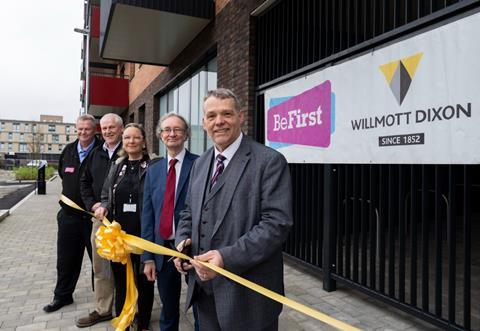
Q: Can I ask how far you are towards your 50,000 target by 2037?
A: WeŌĆÖll have 5,000 homes by 2026-27 that Be First itself has built. But remember, weŌĆÖre also working with three other build-to-rent organisations in the borough. WeŌĆÖve got a number of different developers and investors coming in as well.
So, if you ask me what monies have come in, and where are we going with it all? Be First has put 27,000 homes through planning. [And weŌĆÖve achieved] 20% of LondonŌĆÖs social affordable housing since lockdown, which is quite a number. And that will continue.
Q: What is the number when talking about social housing?
A: I was going to say you canŌĆÖt say that. I really struggle with ŌĆ£social housingŌĆØ being the name, because social housing was what was given by Margaret Thatcher to say, ŌĆ£youŌĆÖre not good enough to buy a house because youŌĆÖre on the socialŌĆØ. So I prefer ŌĆ£council propertiesŌĆØ.
What weŌĆÖve also got to understand is there is not one type of person that needs help. And our problem in London, possibly across the country, is that we think thereŌĆÖs people in need, and thereŌĆÖs people that can buy. We forget about the 90% of people that are in the middle.
And so what weŌĆÖve done is weŌĆÖve given, as I say, six different rental models, plus the ability for people to invest. So, by doing that, I class it all as one and thatŌĆÖs what weŌĆÖve got to do if we really want to fix the housing model In this country right now.
Q: So how many homes have been completed?
A: At the moment, thereŌĆÖs probably about 5,000 with us as Reside, and the private sector. So thereŌĆÖs 45,000 to go. But we should have built another, close to 3,000 by 2026-27.
WhatŌĆÖs really interesting is that weŌĆÖve already put 27,000 homes through planning. That means every one of those homes could be built if we have the right business model for it. And thatŌĆÖs where the challenge now is.
There are actually 1.5 million homes that could be built in England and Wales today. There are 289,000 in London alone. So actually, the planning permissions are there. What isnŌĆÖt there is the know-how to get them out of the ground. And thatŌĆÖs what weŌĆÖve got to really challenge government about at national, regional and local levels.
Q: Can I just ask you about the construction risk in your model? I donŌĆÖt need to tell you how many councils have screwed this up. How do you not screw up the construction risk?
A: I think itŌĆÖs all about accountability, I think everyone should be accountable. And, if you look at what we are trying to do in governance terms, no member or officer is actually a board member of Reside or Be First ŌĆō they have their own boards.
We are the shareholder in the same way as we were with the film studios [Wharf Studios and Eastbrook Studios development]. We were the people that put it through planning, we were the people that came up with the design. But we donŌĆÖt know how to run it.
So why try and run it? This is where you need the partnership between public and private. So, yes, we can borrow the money cheaper, which lowers the risk. We can bring together land acquisition, compulsory purchase orders to lower the risk, we can do a lot of things to lower the risk.
Q: Who takes the construction risk though?
A: There is a partnership. We tell the contractors what we want built in the framework and the cost framing that we want it done within. They then take that risk, knowing itŌĆÖs gone through planning quicker than anywhere else. ItŌĆÖs already got guarantees, like we will buy all the affordable homes.
So we try and de-risk as much as we can, from the public sector point of view, to support the private sector to deliver outcomes. Because no local authority actually directly builds their own homes anymore. TtŌĆÖs a partnership.
So both parties have risk. ItŌĆÖs how do we mitigate that the best we can for the outcomes that we need?
Q: But, if the prices go up on the materials, thatŌĆÖs their risk isnŌĆÖt it?
A: It is. But then there are times when youŌĆÖve got to be honest about it. No one expected prices to go up 30% in six months.
So we need to look at what happens because if those houses donŌĆÖt get built, the risk to the local authority is that my temporary accommodation costs go through the roof, because I canŌĆÖt house these people.
So itŌĆÖs about being practical about shared risk. We are the only authority in London to reduce temporary accommodation five years in a row.
Q: Have you had contractors come back to you and say,ŌĆścan we negotiate the packageŌĆÖ? Or say that they are going to stop building because they canŌĆÖt sell the private homes?
A: No. Because 90% of our housing is all rental. So I donŌĆÖt worry about the private sector sale. This is about how it works in a rental model. And a rental model is actually much more flexible than the for-sale model.
Now it may be that they would say, ŌĆ£we canŌĆÖt afford to do those lower [rental ends of the market]. WeŌĆÖve got to do more upper.ŌĆØ ThatŌĆÖs fine as well, because actually, in London, we need it all.
It may be right now that the model [dictates that] weŌĆÖve got to do more 80% [of market rate rents] than we can do council equivalent rents or 50% rents. So, if thatŌĆÖs where the model goes right now, because thatŌĆÖs where the market is, we will do that.
Bear in mind that 85% of all the housing we have built has gone to local families and a third of my borough pays market rent. So thereŌĆÖs always a demand.

Q: Has anybody asked you to distill your model into a ŌĆ£how toŌĆØ for other local authorities?
A: Well, every area is unique. But are there some principles that we should be following at a nationwide level.
I believe in the right to rent, I believe in the right to invest, I believe in the right to move ŌĆō those three things could replace the right to buy. And I say that because of 40 years of the housing market and not reinvesting in the fundamental infrastructure.
Q: WhatŌĆÖs going to happen under a Labour government? I see no promises from Labour at all on the fundamental point that the country needs more council houses. Where is the detail on how they will ramp up supply?
A: Let me start with a caveat ŌĆō as a politician would. Whatever we say, and weŌĆÖve seen this just in the latest Budget, the Tories try and nick it and then make it fall over.
So thatŌĆÖs why youŌĆÖve not seen what I class as detailed policy from the Labour Party yet. But I think, when they call the election, youŌĆÖll see some serious policy coming through on housing.
I say that because, in my many different roles, IŌĆÖve been articulating this for a while now. IŌĆÖve proven that it can work. I donŌĆÖt know what theyŌĆÖve taken from it. IŌĆÖm not in the shadow cabinet. But I can tell you that IŌĆÖve spoken to Matthew Pennycook [the shadow housing minister]. He is a very good lad and he does know what he wants to do.
I think what is really good ŌĆō and what you should be pleased about ŌĆō is that the deputy leader [Angela Rayner] is in charge of housing and community. Because thatŌĆÖs bricks and mortar, hearts and minds.
She understands, sheŌĆÖs from a very similar background to my good self. A proud single parent, working class, may not speak the QueenŌĆÖs English, but gets things done. And thatŌĆÖs really, really important.
I believe in the right to rent, I believe in the right to invest, I believe in the right to move, those three things could replace the right to buy. And I say that because of 40 years of the housing market, and not reinvesting in the fundamental infrastructure
So, when you when you ask, ŌĆ£what are we going to do?ŌĆØ I canŌĆÖt give you a specific. All I can tell you is they have been listening.
I wrote a paper called Build for Britain 15 to 18 months ago now. And that was from talking to the housing associations in the G15. I was listening to the pain of the sector, itŌĆÖs fair to say the frustration of all sectors including local government.
And I wrote in the bits that I thought we could add to, because I think youŌĆÖve got to keep it as simple as possible for people to understand where youŌĆÖre trying to go.
So [what I proposed in my nine-point plan], first is a rentersŌĆÖ charter. Permitted development rights [are] a disgrace. ShouldnŌĆÖt be allowed to happen. If you havenŌĆÖt got the infrastructure, you shouldnŌĆÖt be building the homes.
[So] a rentersŌĆÖ charter saying this is what you can expect, but also this is whatŌĆÖs being asked of you because anti-social behavior is a real issue and local authorities have to deal with it no matter which tenure it comes under.
Second is a community rent model ŌĆō what IŌĆÖve said earlier about the six different rent levels. Because actually the higher rents will subsidise the lower rents, if we do it right.
In my borough alone, the housing revenue account is losing half a million pounds a week because we only charge at one rent. And thatŌĆÖs way below the local housing allowance, because weŌĆÖve always had very low rents. So actually, is that right?
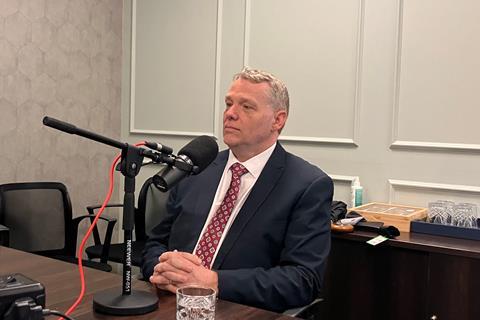
Q: Before you go through all nine points quickly, can you tell me how many people have you got on your council house waiting list?
A: DonŌĆÖt take this as the norm because itŌĆÖs not. When I started as leader, there were 11,800 people on my council waiting list. Today, itŌĆÖs less than 4,800.
No oneŌĆÖs got a better record than me in giving somebody a home in London today. And IŌĆÖm really, really proud, but itŌĆÖs linked to this community rent model.
So let me carry onŌĆ” Point three: a national property register. So weŌĆÖve already got the land registry, letŌĆÖs have another bolt to it where you have an MOT for every house. So it doesnŌĆÖt matter what the tenure is of that property. What we know is itŌĆÖs warm and safe.
And if itŌĆÖs not ready for the 21st century, we ask ŌĆ£what do we need to do?ŌĆØ. By doing that you make it its own asset class, so the ownership doesnŌĆÖt matter and it means you can get institutional investment to actually retrofit every single property in the country without costing the citizen or the state.
We spend ┬Ż28bn a year on housing benefit, most of that goes into the private sector. We use a sixth of that to build new, truly affordable homes, either social or affordable. So my question is, again, why are we doing that? It is bad business for the country
So the right to invest, which is a housing or equity bond, thatŌĆÖs point number four. It doesnŌĆÖt matter if you give someone 2% of that property or whether they own 100% of that bond to that property. The fact is, it means every house that gets built is actually worth something and, by doing this, it also stops rogue landlords.
Point five: flexi tenure. In your life cycle you will start from a low rent possibly, but because you do well in life you pay extra ŌĆō thatŌĆÖs flexi tenure. It may be that you want to invest some of it, it may be in later life, you want to take that investment out. You donŌĆÖt have to move but it should be flexi tenure.
Point six links to decarbonisation. [Point seven] is the national build programme. Public pension funds should have 5% saved into a pot for social, affordable ŌĆ£infrastructure homesŌĆØ. ThatŌĆÖs what they are, they are infrastructure homes. They canŌĆÖt be sold off under the right to buy because they are institutionally owned by the country.
That links into [point eight] the national building fund because the two are linked together. So youŌĆÖve got these British pension funds actually investing in British housing. [Finally, point nine] a national buildersŌĆÖ charter, which means that every home is built to the right standard.
So you have now built the framework of Build for Britain, which means retrofitting the housing that needs retrofitting, investing in new housing, new towns, and IŌĆÖm hoping you will hear some of that sort of rhetoric in the Labour manifesto.
I donŌĆÖt know how much I can tell you, but they are the headlines of the things that I spoke to the Labour Party about.
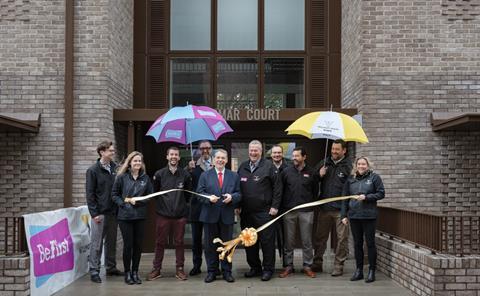
Q: Why do politicians put up targets for housing that they are never going to meet? The Labour PartyŌĆÖs target is the same as the Conservative Party target. And theyŌĆÖre both moonshine.
Why have targets at all? Why not just concentrate your efforts on housing people on a waiting list or something different than these crazy targets.
A: Any target is the wrong target, if weŌĆÖre never going to make itŌĆ” What weŌĆÖve got to ask is, ŌĆ£what does our society need to actually progress?ŌĆØ And it isnŌĆÖt just the target on housing. It is the target on infrastructure, because one of the biggest issues for local government right now, isnŌĆÖt the planning. ItŌĆÖs the infrastructure thatŌĆÖs needed to allow those numbers to be delivered.
Every person, no matter their background, no matter their wealth, no matter their religion, every person deserves a home. So letŌĆÖs start building the target on making sure everyone has a home
Our problem at the moment is we have a really mixed-up system at national, regional, local government. WeŌĆÖre asking the developer to pay for everything, which canŌĆÖt happen. WeŌĆÖre asking local government to underwrite all of it, which canŌĆÖt happen. And so what weŌĆÖve got to say is, ŌĆ£what are we looking to try and do?ŌĆØ.
So, weŌĆÖve got to take it from the other end: what is it we want our society to become? And how does that happen?
So you can have a target, a static number that means nothing to most people. Or we can actually have a joined-up conversation about what are the values we want to share in the 21st century? And thatŌĆÖs where I think we need to take the debate.
Q: But why do politicians promote these targets when they know they have no real way of making them come true?
A: Agreed, but we spend ┬Ż28bn a year on housing benefit, most of that goes into the private sector. We use a sixth of that to build new, truly affordable homes, either social or affordable. So my question is, again, why are we doing that?
It is bad business for the country. We need to look at a mechanism, we need to take that ┬Ż28bn and make it better for the country. That is where we use the pension funds.
Q: But why not just say that instead of saying a 1.5 million homes target?
A: Because actually people like you, the reporters, wonŌĆÖt write the headline. So they have to break it down to a headline that people can see.
Now IŌĆÖve proven as a single council that not only have I built what we needed to build, IŌĆÖve also bought in international investment. So I brought in about ┬Ż5bn. ThereŌĆÖs another ┬Ż5bn in train, the investment coming with all new housing and the film studios and data centres and all the new stuff thatŌĆÖs going to come in. That is where weŌĆÖve got to go.
I canŌĆÖt tell you about targets. People keep saying ŌĆ£target this, target thatŌĆØ. Actually what about the conversation about values? Because, you know, did they have a target of how many homes they were going to build when they did the Anderson Act [the housing act in 1919]?
I donŌĆÖt believe they particularly did. They had a value that said that every person that comes back from the First World War needed a home, because they were heroes.
Well, letŌĆÖs bring those values back about what we want to see in our society. Every person, no matter their background, no matter their wealth, no matter their religion, every person deserves a home. So letŌĆÖs start building the target on making sure everyone has a home.
Because my grandparents, after the Second World War, lived in a wooden shack with their 10 children in Hainault, which my father was very pleased about. He was nine years old when he got into a house. The target for me is to make sure that not one child in every classroom in London is homeless. ThatŌĆÖs my target.
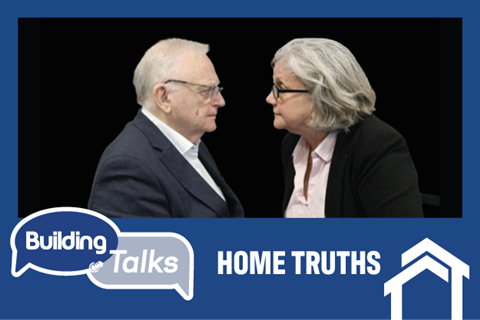
The next episode of Home Truths will be available to download on Tuesday 4 June.
Home Truths is a ║┌Č┤╔ńŪ° Talks series in association with ║┌Č┤╔ńŪ° and Housing Today. Episodes will be released every Tuesday on our websites and will be available via the main podcast providers such as and .
>> Click on the player at the top of this story to hear todayŌĆÖs episode

























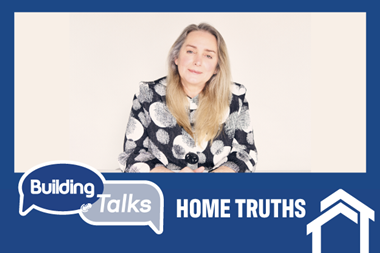
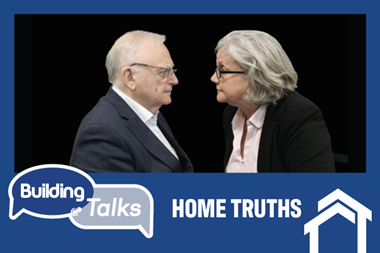

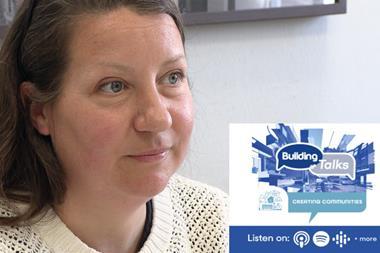






No comments yet